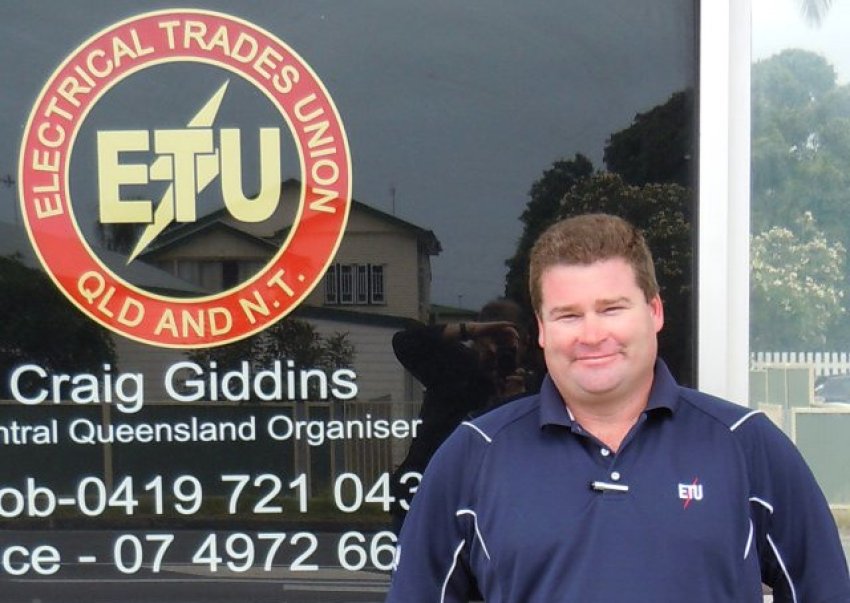
ALP activist Craig Giddins was one of six members of the Port Curtis and Hinterland branch who recently resigned in protest against Queensland Premier Anna Bligh’s public assets sell-off, especially QR National.
Giddins, also the president of the Gladstone branch of the Queensland Council of Unions and state organiser for the Electrical Trades Union (ETU), spoke to Dick Nichols, Socialist Alliance’s national trade union coordinator.
Now that the QR National float is about to close, is the battle over?
I wouldn’t think so. The government has pushed through its sale but the fight will go on up to the next state election. As far as the Queensland branch of the ETU is concerned, the Bligh government has no mandate from the electorate. They’ve gone against the Labor party platform.
Obviously, they may well sell off the assets, but we believe that there is still room to keep the campaign going and to stop any future privatisations.
How do you rate the union campaign against the sell-offs?
The unions involved in the campaign have campaigned well. The message is out there and the community has shown their opposition by at least 83% to 85%.
I saw it recently when protesting the treasurer [Andrew Fraser] in Gladstone. People were just honking their horns continually. The attitude from all sorts of people is: “Here’s something we already own, and they are flogging it off for short-term gain. It’s utterly reprehensible.”
So the campaign has been an anti-Work Choices sort of campaign. The problem is that this country’s right-wing industrial relations laws are stopping it from going that one step further — to where workers withdraw their labour in protest.
ETU comrades in Redbank and Townsville had wildcat strikes, but they were ordered back to work by the Queensland Industrial Relations Commission and told there would be serious consequences if they took further action.
With the fines available against individuals and organisations, it becomes very difficult to get people to take action.
More than 100 ALP branches have opposed the sell-off. But unlike NSW, the parliamentary caucus has not split. What’s happening?
The issue has divided the Labor party internally and externally. We know that there are a number of MPs who are privately opposed to the asset sales, but Bligh, Fraser and [deputy premier] Paul Lucas have quashed any expression of dissent.
I have been privy to emails that show people abusing each other over the asset sales and Labor’s factions are divided more than ever, while rank-and-file branch members’ questions to ministers are ignored.
The leadership group has gone against the party platform. Labor no longer has any democratic method for preselecting candidates and state conferences are a farce. The asset sales debate at the last conference was scheduled for the Sunday afternoon, so that many regional delegates who had had to book their flights home couldn’t take part — a complete farce.
When Kevin Rudd as prime minister stopped members from having a special state conference to discuss the assets sales in depth — after they found out what was proposed to be sold and how — it was a complete and utter disgrace.
Do members think they should continue the fight inside the party?
Many say that the only way that you can change the Labor Party is internally. However, I believe that Labor is pretty much a lost cause now that it has been infiltrated by the career politicians, those people coming straight out of university into jobs as political staffers, to then have the baton handed to them by outgoing MPs.
People increasingly see Labor for what it now is — a centralised machine that makes its decisions without listening to the rank-and-file. Many from the left are turning their backs, but after a lot of soul-searching. My own decision to leave wasn’t taken lightly.
Others are staying because they see the sell-offs as a bump along the road and feel that the left faction needs them. Otherwise, complete control is handed to the right.
For years, whenever the ALP shifted rightward, people argued you had to “stay in and fight” or become politically irrelevant. Is the rise of the Greens making disaffected Labor people feel there is another political home?
I don’t think that the Labor machine is too concerned about that. They see the surge in Green support as a passing phase, but they underestimate what people are thinking.
The Greens have a much better industrial relations policy than Labor’s. People see it and are also turning more to sustainability and renewable energy, where the Greens are strong.
People are sick and tired of the two mouthpieces of big business and want more independents, more of the Greens, and more socially responsible people governing the country.
Unions such as the Queensland Nurses Union have disaffiliated from the ALP. What are unionists saying about the direction to take after cutting ties with Labor?
There is a major call from rank-and-file members of all unions that I’ve dealt with, especially around Central Queensland, for the unions to withdraw from the ALP and start a new political party.
It seems to be something that is growing in momentum: people believe that Labor has lost the plot as far as representing the working class goes and that it’s a sad day that a party that was born from the workers is, when you come down to brass tacks, no different from the Liberals.
How could the unions move towards forming such a party?
I think we will need to see a new, younger generation of union leaders emerge without the old ties with Labor. People with political aspirations within the union movement also have to have a rethink about what they are there for — to represent the workers or as a stepping-stone into Labor politics.
The movement as a whole needs to have an open and frank discussion about where it is going politically.